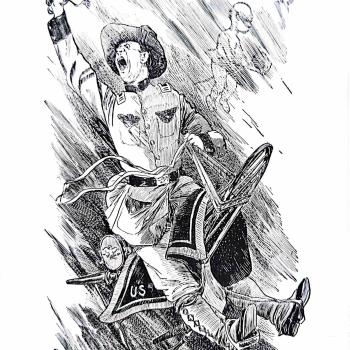It is easy to complain about Mormon Sunday School. I've done it. I still do it sometimes. I've heard the complaint from relatives, students, former students, and colleagues: "We don't learn anything in Sunday School class. The lessons cover the same material year after year. The teachers ask the same rote questions, and members of the class respond with the same rote answers. On top of that, most who are asked to teach Sunday School are not very good teachers." A good lesson is too often only one in which the teacher presents the material felicitously. Only occasionally is it one in which students come away with a new or re-newed insight.
There are different ways of framing that complaint, but it would be dishonest not to recognize how widespread it is. Whether it is the experience of most people is an empirical question that I can't answer. But the complaint is common, especially among the kinds of people who are likely to read this column: college-educated, interested in philosophical and theological ideas.
I've heard several responses to the complaint.
"If you prepared for the class, it would be better because you could contribute."
That may be true. I believe in regular scripture reading. I believe that reading the material assigned for a given week helps make me ready to discuss it. To the degree that I'm prepared, I have something to offer, and presumably the more members who come with something to offer, the better class will be.
But it is at least as true that preparation can make Sunday School class even more frustrating. If I find something in scripture interesting during my study and would like to talk about it, there will often be no point during class at which I can bring my insight into the discussion. The teacher may only nominally ask questions, preferring to lecture (or worse, to read from the manual). Or he may only ask questions with standard answers. If I raise my question or make my point anyway, I am almost certain to be seen as pretentious, interrupting the flow of the lesson to show off.
"Remember what Sunday School classes are for. They aren't college adult education classes. They are to help us remember and think about the basic teachings of the scriptures, and the materials written for them have to be useable by not only those who have been LDS for generations, but also by those who have only been members for a short time."
There is a lot to that answer. It certainly is an explanation of why the correlated curriculum has so much basic material in it. But it doesn't really explain why I ought to be in Sunday School. (And neither does the material in the lesson manuals explain the poor quality of so many lessons taught from them.)
Latter-day Saints get a review of the basics in Sacrament meeting and in Priesthood or Relief Society meetings. Why one more? Perhaps those in congregations with relatively new members need the extra instruction, but if Sunday School classes aren't aimed at me, why expect me to attend? Or why not have different levels of Sunday School class, comparable to beginning, intermediate, and advanced language classes?
"Have more sympathy for the teachers. They didn't train for the job. There is almost no training available, and what is available is often taught by people who also have no training. They are doing a volunteer job in a volunteer church, trying to be responsible members of the church community. And there probably aren't enough really good teachers in any congregation to fill all of the teachings jobs. Someone has to do the job, and few are especially good at it."
This is the response I am most sympathetic to. Since I joined the LDS Church I have been given a lot of assignments that I am not good at. I think I've accepted all of them, which means that I've often done something in a way that others surely found unsatisfactory. I understand that the more of us who take responsibility for the congregation, the better it functions—even if the talents needed aren't distributed among us in the way they would be in an impossible perfect world.
But my sympathy and appreciation for the teacher don't make the class any more interesting, informative, or spiritually uplifting. Why not just cancel Sunday School if it isn't giving us what it should? Many people take that option, "cancelling" it for themselves by skipping.
For me the answer to why I should be in Sunday School is found in understanding it as an inexplicit liturgy. Liturgy is not a word that Mormons use often because our ordinary worship is relatively informal, but (of course) we have a liturgy.





